#British ARmy of the Rhine
Text
Tanks In Germany OTD May 22
May 22 1919 #OTD In Cologne, Germany, John Warwick Brooke takes these photos of a British Army of The Rhine, 12th Bn, Mark V, Hermaphrodite (with one male and one female Sponson) Tank (s/n 9339)

IWM Q 7650

IWM Q 7651

IWM Q 7655
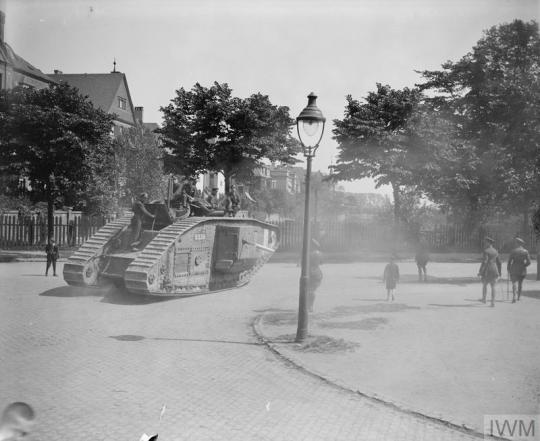
IWM Q 7648
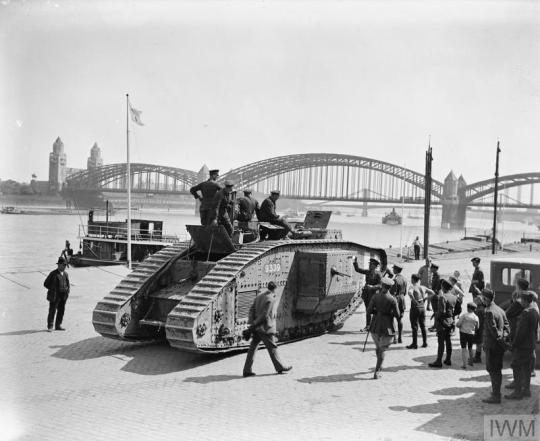
IWM Q 7652
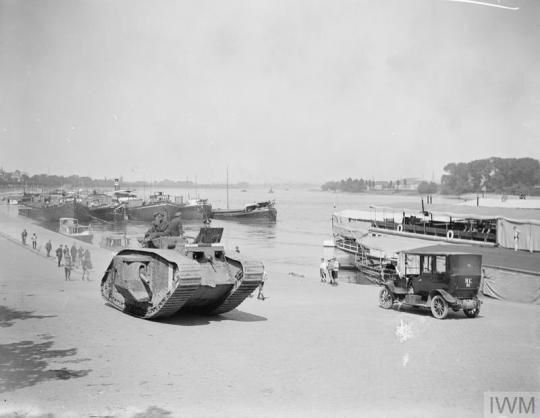
IWM Q 7653
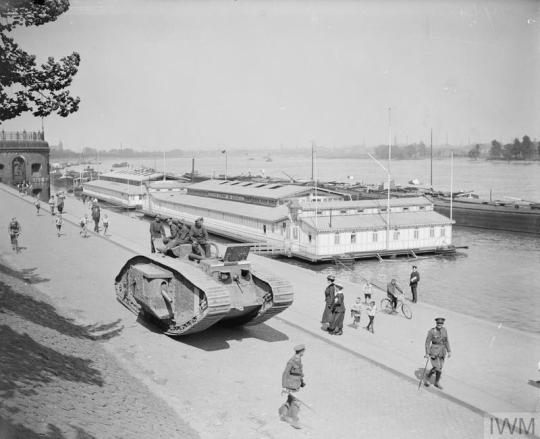
IWM Q 7649
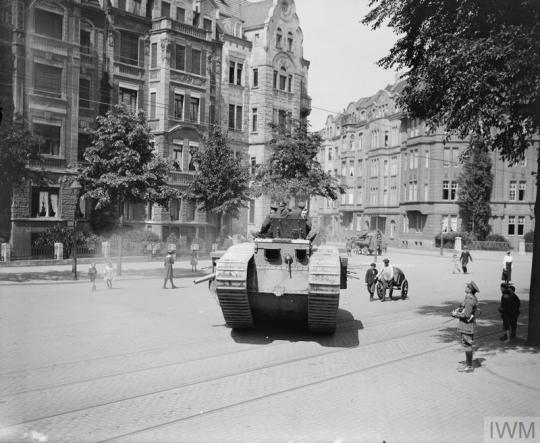
IWM Q 7646
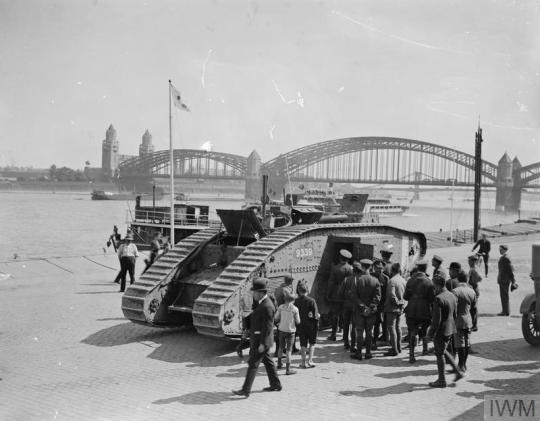
IWM Q 7654 - In the background is the Hohenzollern Bridge
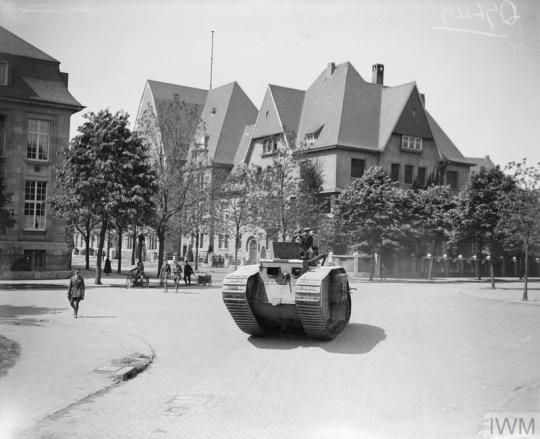
IWM Q 7647
May 22 1919-05-22
45 notes
·
View notes
Text
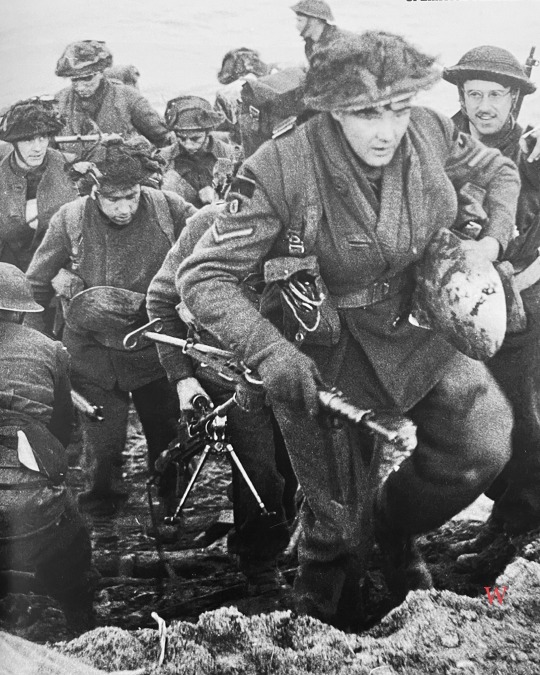
Men of the Scottish Division exit their landing craft on the East side of the Rhine to their assembly point near Xanten, Germany as Operation Plunder gets underway - March 1945
#world war two#1940s#worldwar2photos#history#ww2#wwii#ww2 history#wwii era#world war 2#ww2history#british army#Xanten#germany#1945#Scottish highlanders#Rhine#operation plunder
94 notes
·
View notes
Text
A War History of the Royal Pioneer Corps 1939-1945 :: Major E. H. Rhodes-Wood
A War History of the Royal Pioneer Corps 1939-1945 :: Major E. H. Rhodes-Wood

View On WordPress
#army history#beauman division#bef#books by major e h rhodes-wood#british army corps#caen cherbourg railway#coventry air raids#first edition books#military history#regimental history#rhine crossing#royal pioneer corps#world war 2#world war ii#world war two
1 note
·
View note
Text
Some thoughts about Operation Varsity, which Nix served as an observer and nearly died, portrayed in the Ep 9 of BoB—I’m not sure who actually assigned Nix to be the observer. In Dick’s memoir, he wrote he dispatched Nix, but in Biggest Brother, it seems it was Sink assigned Nix. If it was Dick and if Nix got killed in the operation, I just can’t stop myself imagining what kind of guilt Dick would feel.
Here is an excerpt from Dick's memoir, Beyond Band of Brothers:
The next evening, March 23, Field Marshal Montgomery launched Operation Varsity, a massive attack across the Rhine at Wesel with his entire 2d British Army. Though Ridgway's XVIII Airborne Corps, of which the 101st Airborne Division was an integral part, had originally been slated to participate in the offensive, changes in the troop list resulted in William (Bud) Miley's 17th Airborne Division being the only American airborne division participating in Montgomery's highly touted offensive. The 101st was allowed to send observers, so I dispatched Captain Lewis Nixon.
Fortunately, for Nixon, he was assigned to be jumpmaster of his aircraft. As he approached the drop zone, his plane was struck by heavy antiaircraft fire. Nixon and three other men made it out of the plane, but the rest were lost when the plane crashed. Nix remained with the 17th Airborne Division for one night and was then returned to 2d Battalion at Mourmelon on a special plane. Nix's brush with death left him visibly shaken, particularly when at this stage in the war, no one intentionally put himself in danger now that victory was at hand. Captain Nixon found his usual retreat in alcohol that evening, but I was glad to see him safe. On a side note, Nixon's jump with the 17th Airborne Division qualified him as one of two men in the 506th PIR eligible to wear three stars on his jump wings: Normandy, Holland, and Operation Varsity.
/
An excerpt from Biggest Brother, the Life of Major Dick Winters:
For his S3, Winters soon reclaimed the man he wanted most. Ever since Lewis Nixon had been elevated to Sink's staff, the colonel had become increasingly frustrated with the man's drunkenness. In late March Sink had assigned Nixon to jump as an observer with the 17th Airborne Division during Operation Varsity, the assault on the Ruhr, the industrial center that still propelled Germany's sagging war machine. Nixon was jumpmaster and in the first seat by the door. On March 24, as the plane lumbered over the drop zone, it was hit by flak. Nixon and three others managed to launch themselves out the door before the plane exploded. A day later Nixon was back with the regiment, and while he was drowning the memory with Vat 69, Sink was visiting Winters' headquarters.
"I have a problem, Dick," he said.
"It's Captain Nixon."
Winters knew what the complaint was, so it came as no surprise.
"Goddamit, the man's drunk all the time," Sink said. "I mean, I certainly tip a few myself at night and when off duty, but with him it's all the time. I can't get any damned work out of him. How did you find him to work with?"
"Captain Nixon and I get along very well, sir," Winters replied.
"That's what I had thought," Sink said. "Do you want him back? Can you use him?"
"Oh yes, I can use him," Winters said.
"You got him," Sink said. "Hell, every time I need him he's always here with you anyway. He may as well stay."
So Lewis Nixon, now the only man in the 101st to make three combat jumps, returned to 2nd Battalion.
/
(And, the operation was launched on March 23, 1945. Nix returned the next day. The same day Dick wrote a rather bitchy letter to DeEtta. The tone of this letter is so out his usual character, just Dick being sassy and also mean. Dick was exhausted. His best boyfriend Nix nearly escaped death and was shaken, withdrawing himself into alcohol. It must have some kind of effect on Dick's mental state, if not serious.)
/
The letter from Dick to DeEtta on March 24, 1945:
Dear De-
What kind of stuff are you reading nowadays? From the line of icky stuff you wrote about my picture it sounds like 15¢ worth of pulp magazine. Something that would be called "Ten thrilling love stories" or "True confessions." Anyway don't hand me that kind of stuff. I get to look in the mirror about once a day when I shave and when I'm honest with myself, I just say, "Boy, are you ugly." So to be brief I am just glad I don't have to go around all day looking at myself.
Then you talk about my hair being darker. Hell, no, it's just dirty. I don't get a chance to wash it but a couple times a year. Then there's worry muscles on my forehead. My aching back! I've worry muscles all over my face and the longer this war continues, the deeper they'll grow for I've got over 600 big individual worries myself when I get time to think about my future.
Now we come to the part [in your letter] where my "eyes are keen and seem to follow you wherever you go." This is too much for me, I quit! Hell, that's the way I sleep!
Next, my "mouth seems firmer, and my face broader, yet muscular." Naturally, if you'd been beaten around for so long and eaten noth-ing but K rations, you'd need more than a lipstick to look ----
"When I think of what your eyes have seen, I just can't visualize or imagine that much." Have you read these combat stories in the newspapers and magazines and seen these movies on combat? It makes me shiver too. "Do you jump when somebody slams a door, hit the ground if a car backfires?" Well, that's about all there is to it. Once you've seen one French village, you've seen them all, Holland, Belgium, Alsace-Lorraine, Germany-all the same.
So you met a boy from the 511 [Parachute Infantry Regiment, 11th Airborne Division]? Is that outfit in this man's army? Never heard of them doing anything! Gee, that sure must have been interest-ing to hear what the lad had to say about what paratroopers must go through. Terrible, I imagine. I'lljust bet they run him to death. And if his officers don't work him to death, he'll most likely get killed on a practice jump. Did he tell you about the time he killed three Germans with his bare hands? Or about the time he got a letter from his girl and he was so inspired he went out and killed ten more of those dirty old krauts?
Yes, yes, those poor, poor, tired old krauts, just aching to give up. All you have to do is walk over there and invite them to give up. Why, I imagine he told you how a Yank is better than any three, old, tired krauts. Then there's the one about how they can't shoot worth a damn, can't hit a thing. I know, I've heard them all. To be brief, that's about the same grade as the stuff you handed me in the letter I just went over with you.
Sort of tired tonight. This thing of running a battalion can be rough if you want to make it that way.
On the radio they just announced that the 101st jumped east of the Rhine today. Mighty interesting!
Wish they would have told me so I could have gone along.
Well, here's to the end. This letter looks and sounds like I must have been drinking but I am about as sober as a judge. Only just so tired I am too lazy to lift my pen, let alone think.
Well, I'll be seeing you in church-
Dick
46 notes
·
View notes
Text
The one about the battle and the changing fortunes of Great Men. Hugo openly declares his right to freely move back and forth in time. (Do as you wish. We do not mind.)
The famous point highlights how rain ruined Napoleon’s ideal plan, his masterpiece: “To go straight to the centre of the Allies’ line, to make a breach in the enemy, to cut them in two, to drive the British half back on Hal, and the Prussian half on Tongres, to make two shattered fragments of Wellington and Blücher, to carry Mont-Saint-Jean, to seize Brussels, to hurl the German into the Rhine, and the Englishman into the sea.” None of this transpired. While Napoleon's skilful use of artillery was pivotal, his inflexible plans ultimately led to failure, revealing his inability to adapt to changing circumstances.
Wow. Hugo's extensive paragraph pondering Napoleon's fate reflects his deep contemplation on the matter. He had so many questions concerning this issue.
On a personal note, I can't help but feel a sense of satisfaction that even the most formidable army of its time, with superior artillery, faced defeat. It offers hope that such outcomes are possible.
Today's illustration. I was looking for a painting where you can see a muddy road. And here it is. (As a bonus - Napoleon refusing to leave the battlefield in a carriage)
Ernst Crofts "On the evening of the battle of Waterloo"

And beautiful Turner with his The Field of Waterloo

21 notes
·
View notes
Text
Desaix / ドゼー and Clive / クレーベ
Desaix (JP: ドゼー; rōmaji: dozē) is the chancellor of Zofia who stages a coup of the kingdom in Fire Emblem: Gaiden and Echoes: Shadows of Valentia. He is named after Louis Desaix (JP: ルイ・ドゼー; rōmaji: rui dozē), one of the most highly regarded generals of the French Revolutionary Wars. Born into a noble house, Desaix began his military training at age eight. By age 15 he was a second lieutenant. After the Revolution began, he served under Victor de Broglie, chief of staff of the Army on the Rhine. Desaix would quickly ascend through the military, serving as a commander under Jean-Baptiste Jourdan and Jean Victor Marie Moreau during the invasion of Bavaria. Soon after meeting General Napoleon Bonaparte in Italy, Desaix was assigned to the campaign in Egypt. There he continued to prove a valuable asset as a commander in the Battle of Alexandria and Battle of the Pyramids. His victories over Murad Bey the Mamluks earned him the title of "Just Sultan" among the peasants of Egypt until authority was given to his fellow commander Jean-Baptiste Kléber. Desaix would join Bonaparte in Italy once more, where he died in the Battle of Marengo.
Clive is the former leader of Zofia's resistance force - the Deliverance - against the Rigelian Empire and Desaix's coup before relinquishing command to Alm. His name may be derivative of Robert Clive, a British baron and colonial, who became the first British to govern the Bengal Presidency largely credited for the East India Company planting roots in that region of India. More likely, it was a close approximation of Clive's Japanese name.
In Japanese, Clive's name is クレーベ (rōmaji: kurēbe), officially romanized as Clerbe. This seems to be a corruption of the surname of a contemporary to Desaix and Bonaparte, Jean-Baptiste Kléber (JP: ジャン=バティスト・クレベール; rōmaji: jan-batisto kurebēr). Unlike his fellow generals, Kléber was common-born, which withheld his promotion under the French Royal Army. At the outset of the Revolutionary Wars, he reenlisted, where he quickly rose through the ranks, eventually becoming second-in-command. He participated in the campaign in Egypt and Syria. However, when the expedition turned sour for Napoleon, the general withdrew, leaving the remaining French army holding Egypt in the hands of Kléber without a word prior. And it would be in Cairo that he would be assassinated, on the same day that his close friend Louis Desaix would be killed in action. While Kléber was highly regarded by Napoleon for his skill, Emperor-to-be had the commander buried on a remote island, fearing his tomb to be used as a symbol of Republicanism.
While the character of Clive is not of common birth, the reference to Kléber is likely meant to allude to his desire to fight alongside the commonfolk under the banner of the Deliverance. Him being in conflict against the encroaching empire could relate to Napoleon's interpretation of his character as representing Republicanism. Additionally, Clive stepping down from leadership of the Deliverance could be based on Kléber declining supreme command over the French Revolutionary Army.
On the other hand, Louis Desaix's position as "sultan" over Egypt during the bulk of the Egyptian and Syrian expeditions was likely the primary reason for Desaix's name and role in the story, aiding the Rigelian Empire's expansion into Zofia while gaining greater social standing over the region.
20 notes
·
View notes
Text







Robert Tavener was born in Hampstead, London in 1920. He was keen on art from a young boy, always drawing in chalk on the pavements.
On leaving school he initially went into office work until in 1940, when aged 20, he joined the Royal Artillery. Robert Tavener completed 6 years war service and was part of the D Day landings at Arromanches, Normandy. Soon after beginning his Military Service in 1941 he took unauthorised absence to head back to London to marry Catherine Skardon, a local girl from Hampstead.
At the end of the war Tavener was given the opportunity to study art with the foundation college of the Rhine Army in the art and design faculty of Gottingen University. There he studied drawing and painting from June 1945 to February 1946. In a special testimonial on leaving the instructor in Drawing and Painting wrote: "I have great pleasure in recommending L/Bdr Tavener as a most promising artist who, given facility for further study should produce work of quality and interest. I consider that in the interest of the community and British Art he should be given every possible assistance to this end."
21 notes
·
View notes
Text

Denarius of Julia Mamaea (180-235 CE). During the Severan dynasty, Julia was one of several women who enjoyed great prominence in the Imperial household (her aunt, Julia Domna, wife of Septimius Severus, was a major intellectual and cultural force who maintained her own salon during Septimius' reign). When Julia Mamaea's son Severus Alexander ascended to the throne following the assassination of his cousin Elagabalus, Julia became his chief advisor. Though Alexander was initially far more popular than Elagabalus, he made the mistake of alienating the army, and the Rhine legions killed both him and his mother during a mutiny in 235; this marked both the end of the Severan dynasty and the beginning of the fifty-year period of turmoil and civil conflict that would end only with the accession of Diocletian.
On the obverse, the bust of Julia Mamaea; on the reverse, the figure of Juno Conservatrix (Juno the Preserver). The goddess holds a patera (sacrificial dish) and is accompanied by a peacock, her sacred bird. The denarius was minted between 225 and 235 and was found in Essex, England, UK. Photo credit: The Portable Antiquities Scheme/ The Trustees of the British Museum.
#classics#tagamemnon#Ancient Rome#Roman Empire#ancient history#Roman history#Severan Dynasty#art#art history#ancient art#Roman art#Ancient Roman art#Roman Imperial art#Roman religion#Ancient Roman religion#religio Romana#coins#ancient coins#Roman coins#Ancient Roman coins#denarius#numismatics#ancient numismatics#metalwork#silver#silverwork#British Museum
49 notes
·
View notes
Text

Conqueror heavy tank serving with the British Army Of the Rhine, 1950s
12 notes
·
View notes
Text

1945 01 14 Headlong into the Clash - Robert Taylor
14 January 1945; and the war was not going well for Germany. The noose was tightening as American, British and Canadian armies, having broken out from their Normandy landings seven months earlier, stood on the banks of the Rhine. In the east vast numbers of Russians were driving relentlessly towards Berlin. On their bomb-cratered airfields the Luftwaffe prepared for the final onslaught during the Defense of the Reich.Despite the shock of Operation Bodenplatte on New Year’s Eve – the Luftwaffe’s unexpected yet unsuccessful attempt to wipe out the Allied air forces on their advanced airfields in the Low Countries – Germany had all but surrendered air superiority to the Allies. Today, therefore, was yet another gamble as they assembled some 200 fighters to counter nearly 900 Eighth Air Force bombers, and almost as many fighter escorts, tasked with destroying oil refineries, storage depots and other strategic targets in central Germany. For the Luftwaffe the day was to end in retreat and disaster; they lost 161 fighters, the highest number ever recorded. Never again would the once mighty Jagdwaffe rise in strength to challenge the Mighty Eighth.Few artists can capture the ferocity of an aerial battle with the skill and ability of Robert Taylor, and this breath-taking painting will undoubtedly rank as one of the pinnacles in his long and distinguished career. He captures a moment during that massive aerial battle in January 1945 near Ludwigslust in northern Germany, as enemy fighters from JG300 and JG301 make a head-on attack through a close formation of B-17s from the 390th Bomb Group who are heading to bomb Magdeburg. But their ever-vigilant P-51 escorts are aware of the threat and quickly engage the enemy with devastating results.In the center of the action Flt Lt Joe Peterburs of the 20th Fighter Group screams past the Bf109G of Lt Bruno Klostermann from II./JG300 who is attempting to penetrate the bomber formation. Peterburs claimed an Fw190 during the battle, Klostermann, however, will not survive the day.
18 notes
·
View notes
Photo
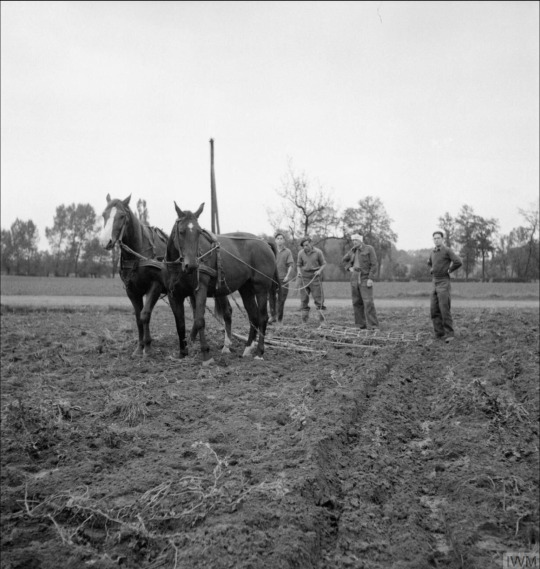
GERMANY UNDER ALLIED OCCUPATION
Object description: Students at the British Army of the Rhine Agricultural College, Ostinghausen, get instruction in working a pair of horses dragging a set of harrows.
Creator: No. 5 Army Film and Photo Section, Army Film and Photographic Unit, Lauder G K (Sergeant)
Production date: 1946-10-08
Catalogue number: BU 13209
Part of WAR OFFICE SECOND WORLD WAR OFFICIAL COLLECTION
Imperial War Museum
#working horses#horses#draft#draught#Rhine Agricultural College#military history#Ostinghausen#Deutschland#Germany#Sergeant G. K. Lauder#No. 5 Army Film and Photo Section#1946#War Office Second World War Official Collection#Imperial War Museum
8 notes
·
View notes
Text

British soldiers use smoke generators to lay smoke just before (and during) the Rhine crossing - March 1945
#world war two#1940s#worldwar2photos#history#ww2#wwii#ww2 history#wwii era#world war 2#british army#smokescreen#smoke#Rhine#Germany#1945
70 notes
·
View notes
Text

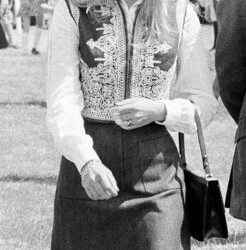
10 June 1975
Princess Anne visits the British Rhine Army Summer Show 1975 at Bad Lippspringe, West Germany
© Heinz Ducklau
35 notes
·
View notes
Text

Go For Broke
Gung Ho
War Head
The Devil's Cavaliers
Escape from Angola
The Mark of the Hawk
The Proud and the Damned
Yellowneck
Three Came Home
The Torch
Hell in Normandy
The Adventures of Tartu
Captain Scarlett
The Last Chance
The Bushwackers
This Is the Army
Kansas Pacific
The Avenger
Blood on the Sun
Flying Blind
Eagle in a Cage
The Big Lift
British Intelligence
Submarine Alert
Appointment in Tokyo
The Battle of Britain
The Memphis Belle
Divide and Conquer
The Battle of China
The Battle of Russia
Desert Victory
The Great Battle of the Volga
Prelude to War
The Nazis Strike
Attack in the Pacific
Attack! The Battle for New Britain
After Mein Kampf
Nuremberg Trials
The Secret Life of Adolf Hitler
Combat America
December 7, 1941
Payoff in the Pacific
True Glory
Tunisian Victory
The KGB Connections
Report from the Aleutians
The Stilwell Road
Submarine Warfare
Thunderbolt
To the Shores of Iwo Jima
Marines at Tarawa-Return to Guam
The Battle of San Pietro
The Pacific in Eruption
Awakening in the Pacific
The Rise of the Japanese Empire
America Goes to War in the Pacific
The U.S. and the Philippines
The Navy Holds - 1942
Guadalcanal: America's First Offensive
War in the North: The Aleutians
The Road Back: New Guinea
up the solomon's ladder bougainville
Attack in the Central Pacific:
Makin and Tarawa
The War at Sea
Speeding Up the Attack:
The Marshalls
Stepping Stones to the Philippines
Battle for the Marianas
The War in the China - Burma
India Theatre
Palau: The Fight for Bloody Nose Ridge
MacArthur Returns to the Philippines
Bloody Iwo
At Japan's Doorstep: Okinawa
The Air War on Japan
the surrounded and occupation of japan
Shiting Tides in the Orient
War in Korea
Prelude to War
America's Unpreparedness
America Goes to War
Platform for Invasion
Africa, Our First Offensive
The Campaign
Rommel Routed
Sicily, Operation Huskey Assault on Italy
Assault on Italy
The GI, Hero of the War
Victory in Italy
Preparation for Invasion
D-Day, August 4th
Beachhead and Breakthrough
Liberation of Paris
Pursuit
The Battle of Supply
The Air War
The Battle of the Bulge
Crossing the Rhine
Overrunning Germany
Victory's Aftermath
Russia
Review
5 notes
·
View notes
Text
Monty’s Men: The British Army and the Liberation of Europe by John Buckley
I don’t think you can review a book largely about Field Marshal Bernard Law Montgomery - the clue is in the name - without first stating your opinion on the man himself. Perhaps no other general of the Second World War is so polarising - British opinions tend to vary from praise to biting criticism, whereas American opinions run the range from biting criticism to believing that he was significantly worse than Hitler. My opinion is that, while he was deeply flawed, he was for the most part a supremely competent commander, and that he generally got less men killed than most of his counterparts. It must be remembered, too, that he was commanding an army that was nearing the limit of its potential manpower - he couldn’t afford to expend men in the same way that the Soviets or the Americans could. His chief problem, of course, was his vanity, his unerring ability to place his foot directly in his mouth, and his total inability to work well in a coalition. Basically, there’s certainly a lot to criticise, but calling him ‘tHe WoRsT gEnErAl Of WoRlD WaR tWo’ is having a bit of a laugh.
Much of the Monty bashing, Buckley posits, has been shifted onto the British Army itself, which has been cast as a plodding, unimaginative and incompetent force since 1945 by the likes of, in order, Liddell Hart, ex-German General, Cornelius Ryan and Max Hastings, Hollywood, and video games. This is true to an extent, especially in Liddell Hart’s case as he was trying to prove that his prewar ideas would have won the war. Yet I feel like these charges are generally levelled against the Allies as a whole, largely due to the continuing fetish for the forces of Nazi Germany. Still, there’s enough there in the popular imagination for Buckley to counter, and he does a pretty effective job.
Buckley puts postwar criticism of the British Army into context, particularly in Normandy. There, the British and Canadians faced the lion’s share of German armour, while still evolving their doctrines for cooperation between infantry and armour, and while dealing with ground that heavily suited the defence. As the campaign progressed, the British Second Army improved, while the concentration of German forces eventually allowed the Americans to start the breakout in Operation Cobra. The British then managed to advance from the Seine to the Dutch border with a speed quite at odds with the idea that they were a plodding morass, and proved quite capable of handling the Germans while reducing their pocket on the Waal in the autumn of 1944. They proved the capability of their combined arms operations in the Reichwald and while crossing the Rhine. The Second Army, it seems, proved especially proficient in the set-piece battle. The importance of the infantry, rather than simply blasting through Europe with artillery, was made clear by their casualties - 70% of total British losses in Northwest Europe, which eventually necessitated the breaking up of units to keep others going.
Buckley is not without criticisms, however, and none of them seem particularly unfair. Market Garden is rightly derided as a frankly poor plan, as was the failure to start clearing the Scheldt Estuary early, which led to a campaign that was longer and bloodier than it needed to be. Goodwood was a bit messy, and Montgomery absolutely should not have told Eisenhower it was going to be a breakthrough operation. (It wasn’t. He knew it wasn’t. It still baffles me that he told Ike it was.) At times, he says, Montgomery’s forces could be operationally inflexible, which might have lost opportunities to exploit successes on the battlefield. The British didn’t really have a standard doctrine at the start of the Normandy campaign and had to learn a lot of things on the fly, particularly as a lot of what worked in the desert and Italy didn’t translate well to Western Europe. Ultimately, however, these were comparatively minor flaws, especially when compared to the state of the Germans opposite by 1944.
I do have one criticism of this book, and that’s in the title - ‘Monty’s Men.’ It’s somewhat tempered by the subtitle, but if someone just saw ‘Monty’s Men’ on its own, they’d quite reasonably assume that it would cover the British and the Canadians. It doesn’t - this is mostly just about the British, which the activities of the First Canadian Army covered from the perspective of the attached British corps (of which there was usually at least one.) Apart from Crerar and Simonds, there aren’t really any Canadian protagonists here. Keep that in mind if you were hoping for a broader history of the 21st Army Group. On a lesser note, there does seem to be a slight bias towards the 11th Armoured Division, but that’s more about my very specific opinions about British armoured divisions, and I don’t think his opinions about the 11th (vs the Guards and the 7th) are too egregious or unwarranted.
Overall, I enjoyed my time with Monty’s Men. I don’t know if it’ll change anyone’s mind on Monty - most people with an interest in the subject have probably made up their minds by now - but even if you hate him, it’s worth a look just to see how the British Army fought in Europe.
4 notes
·
View notes
Photo







Robert Tavener (1920 - 2004 British), Linocuts.
Robert Tavener was born in Hampstead, London in 1920. He was keen on art from a young boy, always drawing in chalk on the pavements.
On leaving school he initially went into office work until in 1940, when aged 20, he joined the Royal Artillery. Robert Tavener completed 6 years war service and was part of the D Day landings at Arromanches, Normandy. Soon after beginning his Military Service in 1941 he took unauthorised absence to head back to London to marry Catherine Skardon, a local girl from Hampstead.
At the end of the war Tavener was given the opportunity to study art with the foundation college of the Rhine Army in the art and design faculty of Gottingen University. There he studied drawing and painting from June 1945 to February 1946.
In a special testimonial on leaving the instructor in Drawing and Painting wrote: "I have great pleasure in recommending L/Bdr Tavener as a most promising artist who, given facility for further study should produce work of quality and interest. I consider that in the interest of the community and British Art he should be given every possible assistance to this end."
Continue reading https://www.emmamason.co.uk/artist/robert-tavener
16 notes
·
View notes